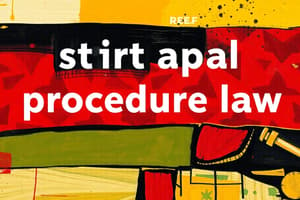Podcast
Questions and Answers
What is procedural fairness and its significance in dispute resolution?
What is procedural fairness and its significance in dispute resolution?
Procedural fairness refers to processes that ensure disputes are resolved fairly, including rights such as being heard and having unbiased decision-makers.
Describe the principle of the rule of law and its implications for society.
Describe the principle of the rule of law and its implications for society.
The rule of law is the principle that nobody is above the law, ensuring that laws govern a society rather than arbitrary decisions by individual government officials.
Explain the concept of precedent in the context of common law.
Explain the concept of precedent in the context of common law.
Precedent is a legal principle established by a judgment that provides guidance for deciding future cases with similar facts in common law.
What distinguishes the roles of a plaintiff and a defendant in a legal case?
What distinguishes the roles of a plaintiff and a defendant in a legal case?
Identify the primary function of the High Court in the judicial system.
Identify the primary function of the High Court in the judicial system.
What is the primary role of family courts in Australia?
What is the primary role of family courts in Australia?
How does the legislative process begin in the Australian Parliament?
How does the legislative process begin in the Australian Parliament?
What are the three branches of government defined by the separation of powers?
What are the three branches of government defined by the separation of powers?
What distinguishes exclusive powers from concurrent powers in Australia?
What distinguishes exclusive powers from concurrent powers in Australia?
What role do treaties play in international law?
What role do treaties play in international law?
How are ATSI customary laws integrated into contemporary Australian law?
How are ATSI customary laws integrated into contemporary Australian law?
What is the significance of the United Nations in international law?
What is the significance of the United Nations in international law?
What is a key difference between declarations and treaties in international law?
What is a key difference between declarations and treaties in international law?
What is the significance of royal assent in the legislative process?
What is the significance of royal assent in the legislative process?
What are two examples of residual powers in Australia?
What are two examples of residual powers in Australia?
Flashcards are hidden until you start studying
Study Notes
Key Legal Concepts
- Procedural Fairness: Ensures dispute resolution is fair, involving the right to be heard, a fair hearing, and unbiased decision-making.
- Rule of Law: Establishes that no individual or authority is above the law, protecting against arbitrary governance.
- Anarchy: Characterized by the absence of laws and governing bodies, leading to disorder.
- Tyranny: A system of government where all power is concentrated in a single ruler, often resulting in oppression.
Legal Systems and Principles
- Common Law: Law developed through judicial decisions rather than legislative statutes.
- Precedent: Legal rulings that serve as guidelines for handling similar cases in the future.
- Adversarial System of Trial: Each party presents their case, and the court remains neutral, solely adjudicating based on presented arguments and evidence.
- Judge/Magistrate Role: Responsible for imposing sentences without conducting independent investigations.
Court Structures
- Plaintiff: The individual initiating a lawsuit against another party.
- Defendant: The individual accused of a crime in a court case.
- Local Court: Handles minor civil (up to $100,000) and criminal disputes, presided over by a magistrate.
- District Court: Deals with serious criminal matters (e.g., manslaughter) and civil cases valued between $100,000 and $750,000.
- Supreme Court: Addresses the most serious criminal offenses (e.g., murder) and civil cases exceeding $750,000 with no upper limit.
- High Court: The highest court, handling appeals and constitutional matters, as well as disputes between states and international representatives.
- Coroners Court: Investigates unexplained or suspicious deaths, fires, or explosions.
- Children's Court: Focuses on the welfare of minors, protecting their identities in legal proceedings.
- Family Court: Resolves issues related to divorce, custody, and property division; hears appeals from lower family-related courts.
- Federal Court: Addresses civil disputes governed by federal legislation, excluding family matters.
Legislative Process
- Role of Parliament: Elected representatives debate, pass, and amend proposed legislation.
- NSW Parliament Composition: Bicameral system comprising the Legislative Council (upper house) and Legislative Assembly (lower house).
- Federal Parliament Structure: Comprises the Senate (upper house) and the House of Representatives (lower house).
- Legislative Process Steps: Includes drafting, multiple readings, committee examination, voting, and royal assent to become law.
- Delegated Legislation: Laws created by entities other than the parliament, allowing for regulations and guidelines.
Government Powers
- Exclusive Powers: Held solely by the federal government (e.g., taxation, defense).
- Residual Powers: Powers retained by states, such as public transport and health services.
- Concurrent Powers: Shared by both state and federal governments.
- Separation of Powers: Divides government functions into three branches: Legislature (lawmakers), Executive (administrators), Judiciary (law interpreters).
ATSI Customary Laws
- Acknowledge the significance of the Dreaming in Aboriginal law, emphasizing land and spirituality.
- Integrated into modern Australian law through approaches like conciliation, mediation, and circle sentencing.
State Sovereignty
- Refers to the authority of a state to legislate and enforce laws for its citizens.
Sources of International Law
- International Customary Law: Based on long-standing traditions, seen as fair by many nations, not codified in written form (e.g., laws against genocide).
- Declarations: Non-binding formal statements regarding a country's stance on issues.
- Treaties: Formal agreements that require ratification to become binding in domestic law; can be bilateral (between two states).
United Nations Role
- Aims to maintain international peace and security, promote well-being globally, and foster international cooperation.
- International Court of Justice: Handles disputes between nations and governs international law.
Studying That Suits You
Use AI to generate personalized quizzes and flashcards to suit your learning preferences.




